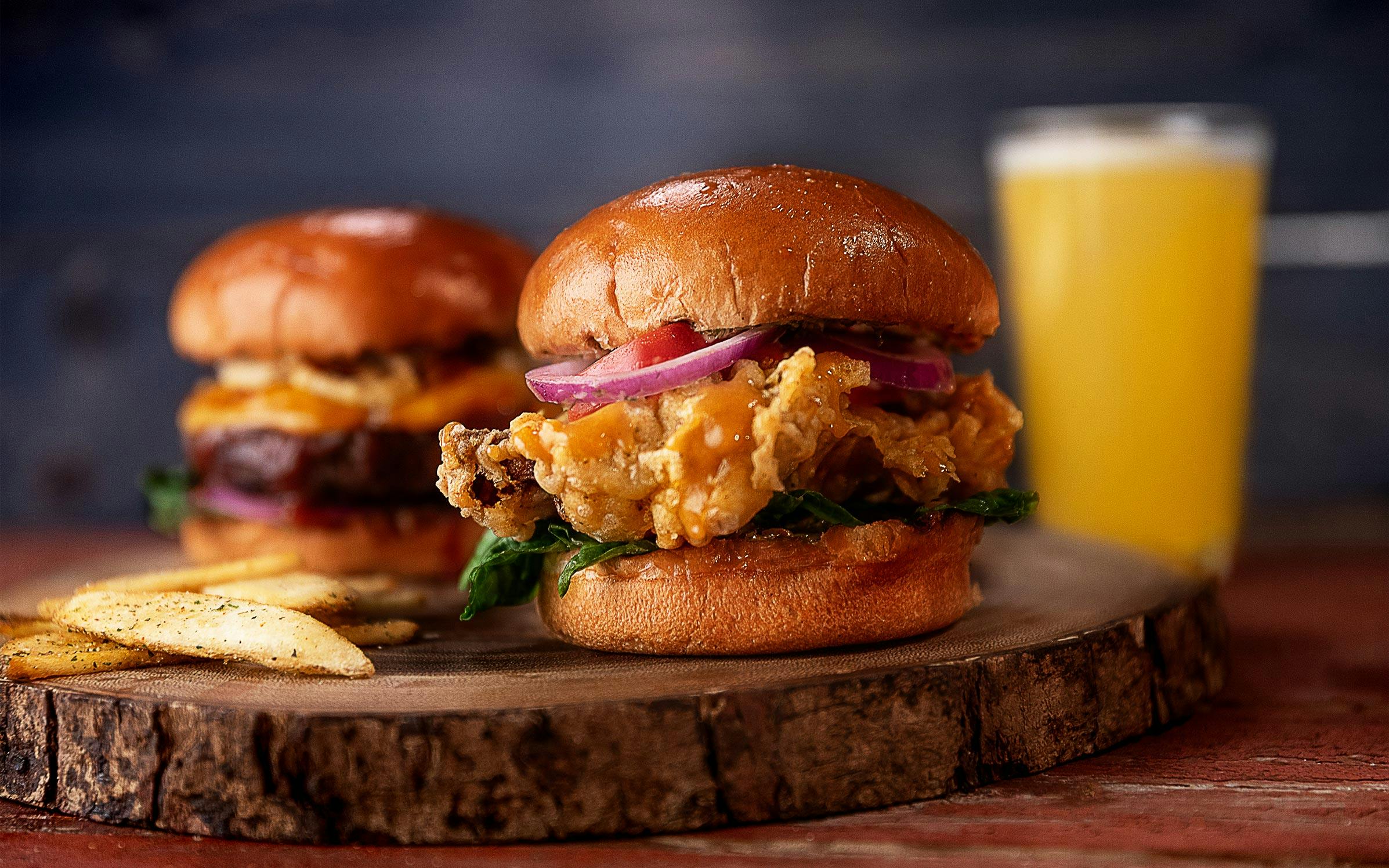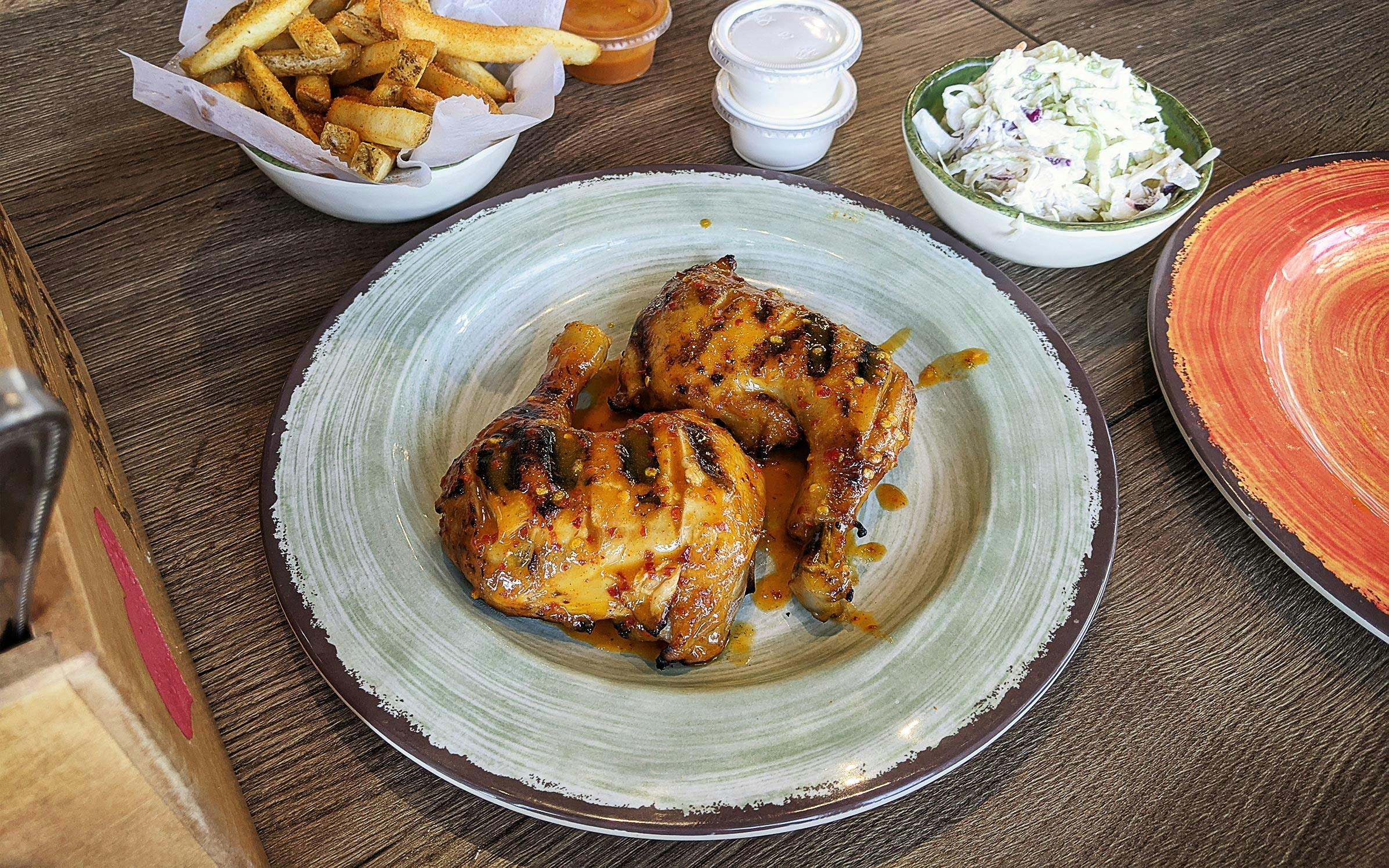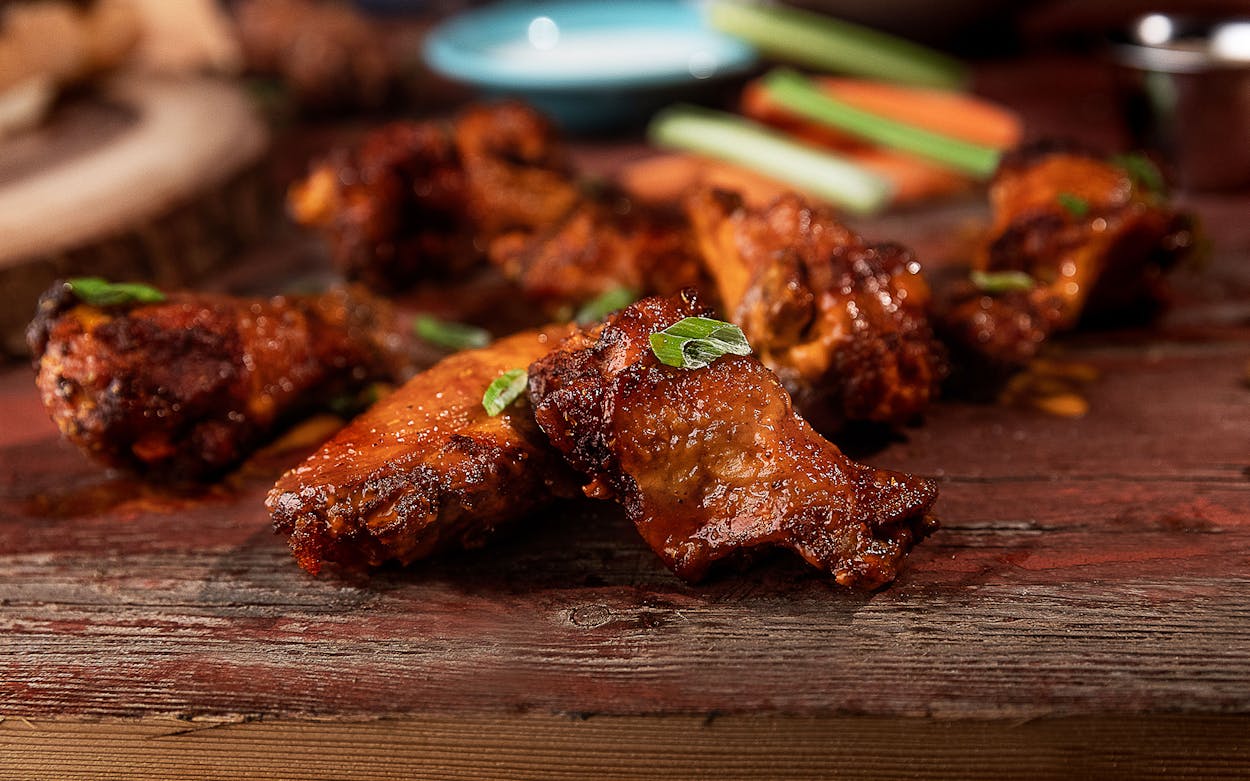South African spicy chicken is sweeping across Texas. In the past decade, the number of peri peri restaurants in the state has jumped from one to thirteen, including two new restaurants so far this year. With roots in African and Portuguese culture, peri peri is a delicious combination of global cultures—with hot peppers, lemon, and garlic in the mix too.
But peri peri’s evangelists in Texas aren’t Portuguese, and few are from South Africa. Instead, the grilled dish has become a cultural touchstone for Texas Muslims. The reasons why go beyond a shared fondness for spicy food to a side of South Africa’s history which, in this country, remains underdiscussed even among peri peri’s biggest fans.
Peri peri chicken is still relatively uncommon in the United States, though it’s beloved in the rest of the world. The South African chain Nando’s has more than a thousand locations globally, but its arrival in two American markets—Chicago and Washington, D.C.—still leaves the rest of the country tragically undersauced.
That’s changing quickly in Texas, thanks largely to the state’s Islamic communities. Texas is home to more Muslims—422,000 at the 2010 U.S. Religion Census—than anywhere else in the country. Nine of Texas’s thirteen peri peri specialists offer halal meats, which comply with Islamic animal slaughter laws; the other four (Houston’s Peli Peli South African Kitchen mini-chain) have served halal food in the past and hope to again soon. On the Facebook group Dallas Halal Restaurants Reviews, there are more than ninety user-submitted reviews comparing the four local peri peri options.
But South Africa was, as of a 2016 survey, just 1.6 percent Muslim. Peri peri chicken’s culinary origins date to native South Africans’ interactions with Christian Portuguese traders, who brought the main ingredient, the bird’s eye chile pepper, to Africa from Brazil as early as the sixteenth century. Why, then, are Muslim diners obsessed with peri peri chicken in Texas? There are two explanations—one obvious, the other rooted in a global history of culinary exchange in the face of racial and religious oppression.
The obvious answer is that peri peri chicken is delicious. Its namesake sauce balances bird’s eye peppers with garlic, lemon, and vinegar, creating a sweet, citrusy, sour, and spicy combination that would taste good on a shoe. (The African bird’s eye pepper is a close cousin of the American Tabasco pepper, and a distant relative of the bird’s eye chiles common in Thai cooking.)
“I couldn’t believe the taste,” says Sal Afridi, recalling his first time trying peri peri. “It was the best chicken I’d ever had. Delicious and very distinct.” This summer, after pandemic-induced delays, the Dubai native opened the first Texas franchise of the British chain Peri Peri Original, in Plano.
Latif Bhegani, in Houston, grills his own backyard version, marinating the bird with garlic, ginger, and salt before finishing it with jarred sauce. A former professional cook, Bhegani says that the sauce’s most important ingredient besides pepper is its vinegar, which is crucial to achieving the right balance and acidity. He grew up eating peri peri in Uganda before moving to London, which has a hundred Nando’s locations and a large population of Muslim immigrants.
Ryan Stewart, who owns the popular chain Mozambik in his native South Africa and is also redesigning the menu at Peli Peli South African Kitchen in Houston, praises the versatility of the spice mix, which can serve as a sauce, glaze, marinade, rub, or several of those in one dish.
“I’ve made a lot of different styles,” Stewart says. “I’ve made a Green Mamba with jalapeño, cilantro, and mint, which makes a fantastic peri peri. I’ve made another one with coconut. … My best combination is making a garlic lemon butter sauce and mixing peri peri into it and putting on my seafood. It’s the best on shrimp.”
But the world has many delicious foods, and few so improbably connected with Islam. Which leads to the second explanation: South Africa’s history as a mostly Christian nation with a Muslim-friendly food industry. Almost every product sold in South African groceries today is halal, and the country’s halal food market is worth $3 billion.
To understand why that happened, we need to talk about apartheid.
Muslims first arrived in South Africa in the 1600s as enslaved or incarcerated people and political exiles banished by the Dutch from their other colonies in Africa and Asia. To this day, a Cape Town suburb, Macassar, is named for the Indonesian city from which an imprisoned sheikh arrived in 1694. After slavery was abolished in South Africa 1834, thousands of poor Muslims came from South Asia as indentured servants, or to serve as traders so that racist whites wouldn’t have to interact directly with native Africans.
During apartheid, South African Muslims were classified by their ethnic origins—generally either Asian, “coloured,” or Malay, an unofficial term for lighter-skinned believers. The white government created a central meat industry monopoly and banned private commercial slaughter, making halal meat unavailable. One of the first goals of the Muslim resistance movement of the 1950s and 1960s was to restore the right to eat in accordance with its faith. Shaheed Tayob, an anthropologist at Stellenbosch University, says Muslim activists succeeded by persuading authorities to permit the halal slaughter of animals during one or two designated times each week.
“They were not thinking about halal per se,” Tayob says. “They were thinking about religious rights, any kind of freedom—a voice for the community in an oppressive context.”
By apartheid’s end in 1994, resistance organizations included a butchers’ association and two groups that certified foods as halal. One of the two certifying groups endorsed the sale of halal products in non-Muslim-owned stores. Liberation created even more change: the meat business was privatized, borders opened for trade, and Muslim groups embarked on major campaigns of cultural identity-building and public education to undo the racist regime’s work. As Tayob has documented, during apartheid some Muslims ordered sandwiches from a popular local chain on blind trust—because they weren’t allowed to step inside the restaurants.
Since halal rules address how to slaughter an animal but not how to process it, newly privatized meatpacking companies saw that going halal could add thousands of customers at a minimal cost. “Say a chicken abattoir slaughters 120,000 chickens a day,” Tayob says. “They could do that huge amount of production with five to ten Muslim employees.”
The halal business quickly expanded into an export powerhouse. In the nineties, the local Shoprite grocery chain began expanding across the continent, bringing South African products with it. It’s estimated that more than 90 percent of products in South African groceries are now halal, including candy, bottled water, and toothpicks.
And so is most of the nation’s peri peri chicken.
The Islamic Council of South Africa nationally certifies poultry for Nando’s, which also began its global expansion in the nineties. Mozambik, Stewart’s restaurant group, sources halal meat too.
“We only purchase halal, because of the quality,” Stewart explains. “At other meat markets, the quality has deteriorated over time. At my restaurants now, we all serve halal because we know what quality we’re getting.”
This is the setting from which Nando’s expanded across the Muslim world. The company arrived in Pakistan and Qatar in 2001, has more restaurants in Malaysia than the United States, and says its biggest location is the three-hundred-seat Nando’s in Riyadh, Saudi Arabia. The attention was noticed by customers who had often felt ignored.
“When you don’t have the option of McDonald’s or KFC or any of the fast food that people take for granted, if something is halal, then everyone jumps on top of it,” says Intisaar Haq, a spice lover in Plano who orders the hottest sauce possible at each new chicken spot he tries.
Many of Texas’s peri peri fanatics trace their conversion to a Nando’s. Tooba Faheem, of Houston, tried Nando’s in Karachi, Pakistan; Haq first sampled Nando’s in Australia; Sal Afridi had it in Dubai; Pepe Garcia, owner of Tio Pepe Chicken in Austin, became a Nando’s convert in London. Garcia and his wife grew so obsessed that they honeymooned in South Africa for research. The newlyweds found that at its source, peri peri sauce is less spicy and more garlicky than the extra-hot versions popular elsewhere.
But Nando’s isn’t in Texas—and its American locations aren’t halal. Business owners like Garcia and Afridi are stepping into the gap. At Tio Pepe, where the kitchen goes through twelve gallons of sauce a week, Garcia says that halal orders have helped sustain his business during the coronavirus pandemic.
“I think at the beginning our sales were maybe 5 percent halal, but as time has passed our sales have grown to maybe 20–30 percent halal,” says Garcia, who was advised to look into halal meat by an industry colleague. “That was one of the things that has really helped us continue [through the pandemic].” He’s so impressed with the quality of the chicken itself that he wonders if he could someday sell halal exclusively.
As more and more Texans get their first taste of peri peri chicken, they’ll fall for its beguiling balance of garlic, acid, chargrilling, and heat. But, if they request their peri peri be prepared halal—if they know the history of identity-building and freedom-fighting that helped the food become an Islamic icon—that piece of chicken will taste even better.
Where to Try Peri Peri Chicken in Texas
If your appetite is whetted to try peri peri, with its combination of flame-grilled chicken, eye-popping sauce, and anti-apartheid resistance history, here are a few Texas spots that can get you started.
Mirchi Peri Peri
1912 Wescott Avenue, Suite 200, Sugar Land
The newest arrival on the Texas scene, Mirchi opened in August. Burgers, pitas, and rice bowls with paneer or falafel are also on the menu.

Peli Peli South African Kitchen
Four locations in Houston (two temporarily closed during the pandemic)
Texas’s first peri peri restaurant just got an all-new menu from South African chef Ryan Stewart, with flavors closer to those of his youth. Due to supply chain issues because of the pandemic and new menu, Peli Peli is not halal, at least for now.
Peri Peri Factory
6375 Westheimer Road, Houston
Just down the road from Houston’s Galleria, Peri Peri Factory offers a choice of seven sauces, from “plain” to “inferno,” on whole chickens, tenders, or baskets of wings.
Peri Peri Original
6205 Coit Road, Suite 352, Plano
The first Texas franchise of a United Kingdom–based chain, Peri Peri Original opened this summer and also offers sundaes and milkshakes to help diners cool down from its spicy sauces.

The Port of Peri Peri
Five locations in Arlington, Frisco, Irving, Plano, and Sugar Land
A national chain based in Chicago, the Port offers grilled and sauce-slathered leg quarters pair that marvelously with creamy coleslaw to tame the heat.
Tio Pepe Chicken
6406 North Interstate 35, Suite 2510 (inside The Linc), Austin
Austin’s only peri peri restaurant will make your order halal for a small added fee. Tio Pepe himself recommends medium or garlic sauce, also conveniently available in retail bottles.






